Fancy an adrenaline-laced fitness challenge? Step out of your comfort zone and into the world of mud, sweat and cheers. Your first adventure race starts here!
Words: Jessica Eveleigh
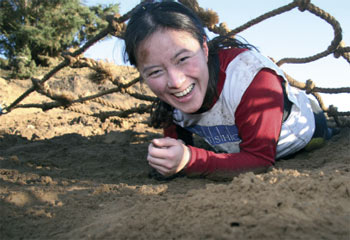
The clock is ticking, your mind is focused and adrenaline is rushing through your veins. You know where you are, but you’re not sure of the route to the next checkpoint. With no time to procrastinate, you have to make a decision quick, cover the distance, complete the next task and finish ahead of the cut-off time. Welcome to the world of adventure racing.
Adventure races are five-hour to five-day – sometimes even longer – multi-discipline events that test competitors on every level. Each one is an emotional, mental and physical journey that demands fitness, technical skills, endurance, strength, speed and team work.
Most races take you off road and into the wilderness, others are urban adventures that utilise the city environment. Running, mountain biking, kayaking and navigating are integral to most, but there is always a strong element of surprise. You won’t know the course details until shortly before the start and, along the way, you may have to scale slippery climbing walls, shimmy under cargo nets, try parkour, or learn survival skills.
“You may have to scale slippery climbing walls, shimmy under cargo nets, try parkour, or learn survival skills.”
“I love AR because you get all the highs and lows of a long-term expedition condensed into a manageable time frame,” says Anna McCormack, 35, who gave up her job working with a youth expedition NGO in Africa to pursue AR full-time.
McCormack is now sponsored by Nike ACG, competes internationally and captains UK women’s squad Buff ENDURE. She is just one of a growing number of action divas who race at elite level in all-girl and mixed teams.
“One of the great things about AR is that so many people from different backgrounds come together in one big melting pot,” says McCormack. “Buff has a multi-sport and
mountaineering background, while other teams have backgrounds in orienteering, fell running or triathlon.”
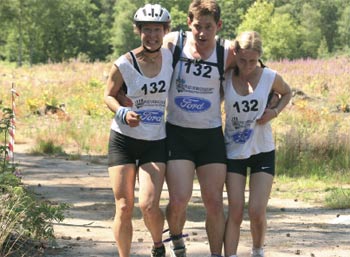
GETTING STARTED
You don’t have to be a world-class athlete to do AR. A number of race series are open to beginners and women are positively encouraged to compete in all-girl or mixed teams.
“AR is very much a team event and involves strategic planning in order to succeed,” says Jim Mee, organiser of the Rat Race Urban Adventure Series. “The girls really
help the guys out with this. The lads want to charge off, but girls plan the route to take in checkpoints more effectively.”
And, there is every reason to give it a go. Training and racing can be the ultimate boost for your body and mind. “Because AR involves a range of disciplines, different muscles and skills are utilised in training and on race days,” says top London personal trainer Jamie Baird. “Cross training for different sports helps reduce the risk of injury, keeps the mind
motivated and is a great way to increase overall strength and cardiovascular fitness.”
Baird also says that women are much more likely to push themselves when they’re competing outdoors in a team environment. “Expect to get a much better workout doing an AR than you ever would in a gym.”
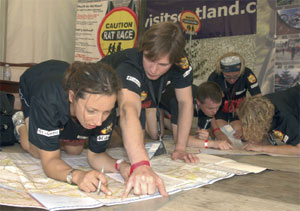
Your first adventure race will almost certainly expose your true colours. According to sports psychologist Dr Paul Dent, adventure racing is a surefire way to discover more about who you are and where your personal strengths and weaknesses lie: “Working in a team you acquire leadership skills, develop the ability to make rash decisions and evaluate situations quickly,” he says. “You learn to believe in yourself. As an individual, you will begin to understand how you react to stress, how strong you really are under pressure, the processes you go through when faced with important decisions and your ability to support others.”
So, have you got what it takes to enter an adventure race? Of course you have. As performance experts say, success is 15 per cent ability, 85 per cent attitude.
TRAIN RIGHT
Anna Sloan, member of Scottish all-girl squad Team Columbia SALT, says the secret to AR training is to achieve a good level of fitness, to work on specific skills and to keep it fun.
“You need basic fitness. That means the ability to run 10km, but it doesn’t matter how fast, and to cycle for a couple of hours without stopping,” she says. “The key is enjoyment. Your team is not going to enjoy the race if you aren’t fit enough to cope. Experience also counts for a lot and the only way to get more experience is to have a go. Basic navigation skills are a must. Get in touch with your local orienteering club, or just pick up a map and go for a walk or ride, following a route as you go along.”
Build up your fitness levels at a realistic pace, practise all the disciplines in the race, and don’t just focus on what you’re already good at. Try two sessions in one day – morning and evening, or back to back – so your muscles are prepared for multi-tasking on race day.
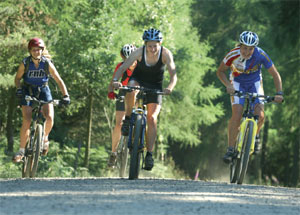
“Your body will cope with two training sessions in one day,” says Baird. “It didn’t complain when you were playing all kinds of games as a kid, so it won’t now. Just make sure
you’re not always training at a high intensity. For example, balance a hard run with a gentle bike, or a hard bike with an easy kayak.”
Baird recommends complementing cardiovascular training with two 40-minute strength sessions per week. It’s also important to pick training routes with similar terrain and conditions to what you’re expecting on race day.
“Pavements and roads aren’t comparable to dirt tracks and moors,” says McCormack. “It’s crucial for girls to work on their technical skills, too. The guys can power through, but the girls can’t compensate with strength in the same way.”
EAT LOTS
As training hots up you’ll notice your waist shrinking but your grocery bill expanding. Get ready to eat more than you’ve ever eaten before! Good nutrition is key and it’s wise to experiment with your diet to see what works best for you.
“I’m a vegetarian, so I have to think carefully about balancing my diet,” says Jackie Lee, 31, who competes with Team Saab Salomon. “I eat plenty of porridge made with soya milk, seeds, brown pasta, tofu, raw vegetables with houmous, yoghurt and free-range eggs. I also try to eat organic. Feed your body with things that make you feel great.”
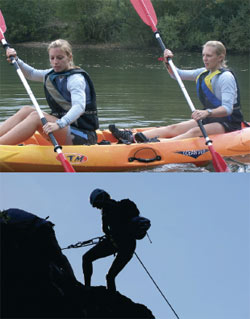
TEAM UP
Get a team together before you start training. Gather a group of friends, team up with fellow running, cycling or triathlon club members, or head to the forum at www.sleepmonsters.com and find some mates online. You can also contact event organisers to see if any team entries need an extra. Train together if you can to build your individual and group strengths. Good communication is vital on race day.
“However good you are as individuals, if you can’t work as a team, you won’t win,” says Mee.
BE PREPARED
Allow plenty of time to gather the right gear and learn how to use it. If this is the first time you’ve used a hydration pack, fill it up, strap it on and go running with it. Check that you have everything on both the mandatory team and individual kit lists. As race day approaches, eat well, sleep well and stay hydrated. Buy a store of nuts, raisins, malt loaf, energy bars and drinks to keep you fuelled on the day, but test out what goes down well, and what doesn’t, in advance of the event. Then, the only thing left to do is race.
“Remember, the view is always better from the top,” says Sloan. “Keep smiling!”
SO YOU WANT TO RACE?
You can find out about adventure races in your area by clicking on the calendar at www.sleepmonsters.com. The best beginner races include:
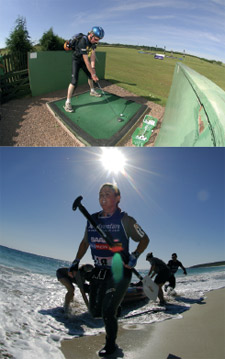
TrailPlus/Helly Hansen Adventure Challenge Series
With no navigating involved, just 6-7 miles’ running, 12 miles’ mountain biking, a kayak sprint and some hidden surprises, TrailPlus events are the perfect tasters to the world of adventure racing. Enter in an all-girl or mixed team and expect to finish inside five hours on a massive high. Start training now and enter at www.trailplus.com.
Ace Races
With checkpoints to cover on foot and bike these one-day events are a great introduction to real AR, so have your compass at the ready. Once you’re over the beginner wobbles, try a two-day event, which includes kayaking and more navigation. Visit www.aceraces.com
Questars
In these one-day adventure races kayaking is an optional extra on top of trail running and mountain biking. Novices with a base level of fitness can enter the rookie races with teams of a similar standard, while superfit and experienced ARs compete in the masters category. Events are held throughout the summer across the UK. Visit www.questars.co.uk
Rat Race Urban Adventure Series
Geared towards newcomers and experts alike, these two-day urban jungle events take place every summer in the UK cities of Bristol, Edinburgh and Manchester. The courses are tough and varied, so take guts and a good level of all-round sports fitness with you. Visit www.ratraceadventure.com
WATCH THE ELITES:
Raid World Champs (www.theraid.org)
Wilderness Arc (www.wildernessarc.com)
Primal Quest (www.ecoprimalquest.com)
MY FIRST ADVENTURE RACE
Jessica Eveleigh writes…
When I signed up for the two-day Rat Race Urban Adventure in Bristol with my super-fit flatmate Diddy and surf buddy Silke, I had never even entered a 5K. I like running and biking in the woods near my Bristol home, kayaking in Wales and surfing in Devon, but doing sports competitively scares me, especially when it involves competing in a team.
As it turned out, I’d never been so motivated about training. It was difficult fitting it all in. Each week I aimed for three runs, a 2.5km swim and daily yoga, plus long sessions on the bike whenever I could. We neglected the kayaking. And navigating and orienteering? Oops, forgot about those, too.
Diddy pushed us on the bikes and taught us technical skills. Silke is a fast runner, I’m a plodder, so she forced me to pick up my pace and feel the benefits. An added bonus was that my surfing improved dramatically, because I had greater strength for paddling out and popping up on bigger waves.
Finally on race day, having rested and carboloaded for 72 hours, we were totally psyched up for action. at 7pm, we joined the line up for the start of the first day’s event, a three-hour foot race and the prologue to day two’s 12-hour multi-sport extravaganza. As part of the navigational challenge, we’d been given maps and checkpoint locations only an hour before the start and had got the values just minutes before. When the start gun sounded, we dashed across the city ticking off as many checkpoints as we could find on route. Paddle races and parkour were thrown into the mix to make it more fun. We romped home with plenty of energy left in the tank for Sunday’s main race.
Sleep that night was impossible as our brains and bodies were buzzing. At the 6.15am briefing, we all picked up maps and checkpoint locations and then assembled at the start line for the 7.30am kick off. 12 hours later when we crossed the finish line at last, we’d run round the harbour, covered 80km on bikes, waded chin-high through a lake and climbed a crane via a wire-rope ladder, and somehow still had smiles beamed across our faces.
It’s amazing what your body can do when it’s given the chance – and when you’ve eaten more energy bars than you ever thought possible. Go on, have a taste!

